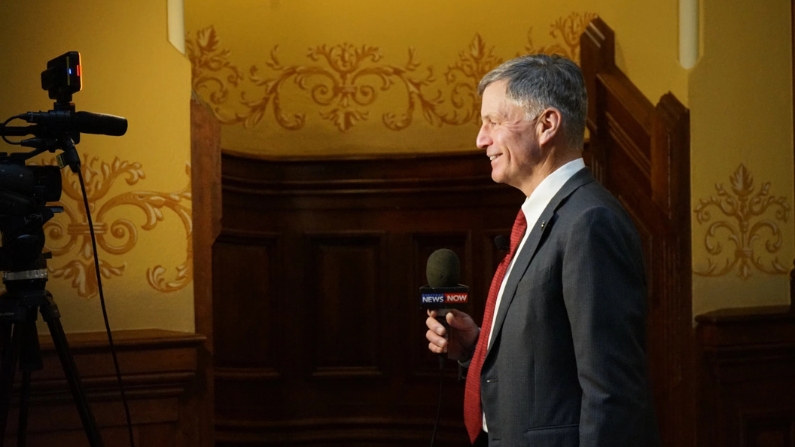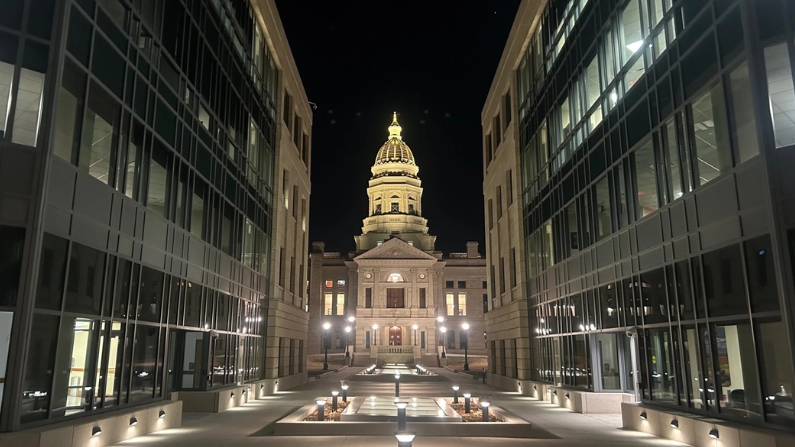Like what you’re reading? Make our newscast part of your daily listening routine too. Subscribe on Spotify (or wherever you listen to podcasts).
After sweeping success in this week’s general election, the Wyoming Freedom Caucus will wield new power in the state Legislature’s House of Representatives.
The further-right GOP faction will aim to appoint their own slate of leaders to key positions, like speaker of the House, majority floor leader and committee chairmanships. Caucus member Rep. Jeremy Haroldson (R-Wheatland) is hoping to become majority floor leader, while Rep. Chip Neiman (R-Hulett) is eyeing the House speakership.
Due to their majority, the faction will have more leeway to determine the legislative agenda.
They needed to get at least 32 seats in the Republican-dominated House to have a simple majority. Wyoming Public Radio estimates the caucus clinched at least 33 of 62 House seats following the election. That’s the most they’ve had since officially forming in September of 2020.
Current members of the caucus told WPR they anticipate their voting bloc this coming legislative session will be even higher, closer to 37. But those members wouldn’t say who makes up that bloc.
WPR’s calculation of at least 33 seats is based on official endorsements, past voting records and campaign finance reports. That number increases to at least 35 when including representatives who are likely to align with the caucus’s priorities but who’ve said they won’t officially join if membership is offered to them.
The Freedom Caucus agenda
The faction plans to try and enact a bevy of fiscally- and socially-conservative policies once in power in January, including reintroducing bills that were vetoed by Gov. Mark Gordon last session or that were voted down in previous legislative sessions.
“I just feel elated for the party in general, from nationally to the state,” said Rep. Christopher Knapp (R-Gillette), the caucus’s vice chair. He was elected to his position in September. “I think that conservatives and those principles of being conservative are reflected now, both nationally and within the state.”
Majority control of the House comes after the more-moderate Wyoming Caucus suffered losses against Freedom Caucus-endorsed candidates in the primary. Moderate incumbents, like House Speaker Rep. Albert Sommers (R-Pinedale), Rep. Tony Niemiec (R-Green River) and Speaker Pro Tempore Rep. Clark Stith (R-Rock Springs), were all defeated by Freedom Caucus candidates in August.
“The change that I would expect to see in the Legislature is probably social legislation,” said outgoing Rep. Clark Stith (R-Rock Springs), chairman of the moderate GOP caucus. “My guess is you’ll have more social legislation that doesn’t affect the budget necessarily. And frankly, from my point of view, may amount to a fair amount of grandstanding.”
In interviews with WPR, Freedom Caucus lawmakers described prioritizing bills that will further defund or restrict diversity, equity and inclusion (DEI) programs in higher education and state government, slash surging property taxes and ban all state-run gun-free zones in Wyoming, among others.
According to Reps. Knapp, John Bear (R-Gillette) and Haroldson, three members of the caucus, a big goal will be adding new requirements to voting in Wyoming elections.
“I will be advancing a bill, and I believe that the Freedom Caucus will really get behind this, that will ensure that only residents of Wyoming with proof of residency and only citizens of the United States with proof of citizenship will vote in Wyoming,” said Bear, former Freedom Caucus chairman.
That seems to mirror a similar measure proposed by Secretary of State Chuck Gray late last year, which some county clerks said could create longer Election Days without eliminating fraud. Gordon vetoed the policy this spring, saying Gray went beyond his authority as secretary of state in trying to implement them.
Wyomingites should also expect a bill that will ensure driver’s licenses authorized by other jurisdictions like California and Colorado for noncitizens will not be validated in the state of Wyoming, according to Bear. It is already illegal to vote in Wyoming state elections as a noncitizen, and some county clerks have told WPR that historically, cases of noncitizens voting in state elections have been rare.
Some in the caucus may draft legislation that would “make private investors fully aware” if private firms are investing in environmental, social and governance efforts in Wyoming, or ESG, he said.
ESG is an investment strategy where one considers environmental, social and governance subjects when deciding to make an investment. Last year, Gray tried to pass new rules that would have required brokers and security agents to disclose ESG principles to their clients, but it was ultimately vetoed by Gordon.
In terms of property tax bills, Bear said he believes there will be another attempt to pass the previously vetoed SF 54 from this year’s budget session. It would have cut 25 percent off assessed home values up to $2 million.

Wyoming Governor Mark Gordon stands before a TV news reporter at the state capitol in Cheyenne, Wyoming. (David Dudley / Wyoming Public Media)
“I really believe that Senate File 54, which passed both houses overwhelmingly and then was vetoed by the governor – you’ll see an effort very similar to that,” said Bear.
Overriding the governor’s veto of SF 54 was one of the main goals members of the caucus had in mind when they asked the House to convene a special session this past spring. That effort eventually failed.
For his part, Knapp said he’ll work to pass a package of bills making Wyoming a friendlier state to the fossil fuel industry. Knapp is a member of the House Minerals, Business and Economic Development Committee.
“I think there will be a dozen or more bills that have to do with that policy to basically open up the market [for that industry],” he said. “The market is so held down right now by government restraints and regulations, and I think it’s just time to free Wyoming from those and allow the market to dictate what energy sources really are the cheapest and most affordable and most reliable.”
Among the bills the Freedom Caucus hopes to push will be a measure rolling back HB 200, Knapp added. That measure passed in 2020 and mandates carbon capture in the state’s coal-fired power plants.
Significance of a majority
More than just legislation, Knapp said he believes a larger and emboldened Freedom Caucus may integrate into the Legislature’s Republican supermajority more broadly, potentially raising the prospect of unified success with legislation. There are only six Democrats in the House.
“I think you’ll see a resurgence in the Republican caucus going forward, because we’ll embrace those principles as a party more,” he said. “[The Republican caucus] is a valuable tool. I mean, communication is a valuable tool, and I think it’s a benefit to everybody in the House and Senate to be able to have that.”
In the last legislative session, the Freedom Caucus counted around 26 members in the House who voted with them.
The caucus was originally created to negotiate on legislation with House leadership, which the caucus’s members often describe as too liberal and as RINOs, or “Republicans In Name Only.”
“It will be interesting to see how the now-minority Wyoming Caucus members behave themselves,” said former Speaker Pro Tempore Rep. Clark Stith (R-Rock Springs). “My guess is the Freedom Caucus will continue to run as a pretty tightly-knit organization. My guess is there won’t be a lot of communication going from the Freedom Caucus to the Wyoming Caucus members before things happen. My guess is that the Freedom Caucus in the House, at least, will want to keep a pretty tight control on what happens.”
When asked how Knapp feels about working around the checks and balances of the Wyoming Senate and Gordon’s veto pen, he said he was optimistic the caucus agenda would be popular.
“As long as we collectively work on a solution together, then there’s really no reason for a veto,” he said. “And I’m going to take that optimism into this session with me. We’re going to come up with a lot of legislation that is very meaningful to Wyoming’s future and to the people of Wyoming. Hopefully we can all work together to meet that need.”
The caucus’s freshman class will start legislating around the same time as Republican President-elect Donald Trump returns to power in the White House and a new Republican-controlled U.S. Senate is sworn in.
This reporting was made possible by a grant from the Corporation For Public Broadcasting, supporting state government coverage in the state. Wyoming Public Media and Jackson Hole Community Radio are partnering to cover state issues both on air and online.






